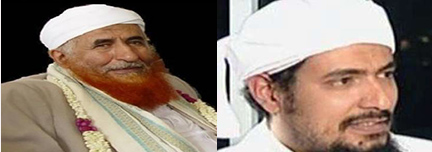
Al-Zindani, father and son
The winds that ushered in the “Arab Spring” were less a simoon, in the sense of a gust that stirs up everything in sight, than they were variable. Regime change has not been the same in every case. Take the case of Yemen, where Ali Abdullah Salih was ousted after three decades in power, but still remains free and influential in Yemen. Such a situation would be impossible for Mubarak, Ben Ali, Qaddafi and especially Bashar al-Asad. Although lives were lost in the Yemeni protests, these were few compared to the bloodshed that rocked Libya and Syria and escalates in Egypt with the recent protests against President Morsi’s removal by the military. Currently Yemen is in the process of a “National Dialogue.” This is admittedly a financially bloated endeavor that only the United Nations could create, but it has brought in a broad array of Yemeni views and has proceeded peacefully and with dignity.
Dialogue is always a plus. Monologue is the problem, whether it is a military dictator or a self-important religious cleric. Now the National Dialogue has been compromised by an irrational monologue carried on by Sheikh Abd al-Majid al-Zindani, a Salafi whose henna redness in his beard is in direct contrast to any common sense and good will. Al-Zindani reminds me of the “moral majority” preacher Jerry Falwell, who founded his own university and soaked up all the lavish praise his accolades could offer. Al-Zindani founded and runs, in his spare time it would seem, al-ImÄn University, which teaches hate more than it professes tolerance. The United States considers him a “Specially Designated Global Terrorist”, for his links to al-Qaeda, but this has not stopped his constant monologue of self-promotion.
Apparently upset that he was not getting enough attention in the media, al-Zindani has written a letter to the Yemeni people claiming that the National Dialogue is against Islam and that the only constitution possible is that of the shari’a (I suspect he has long forgotten about the Constitution of al-Madina). Were he to stop with this generality, little damage would be done. The new Yemeni constitution, like the old ones, will not be ruling out Islamic law, although it certainly will not adopt the narrow views of one sect, especially the imported Salafi variety that al-Zindani tarnishes. But he goes beyond this and labels those who participate in the National Dialogue as guilty of shirk, which is putting some other god or anything above Allah. Yemeni Muslims discussing how best to move forward with a new state that represents all of Yemen: this does not constitute anything remotely like shirk and al-Zindani is using this rhetorical tactic as a political tool. He is so blind to his own ambition that he does not realize that his ambition is a much better example for shirk.
On top of this irrational monologue, the son of al-Zindani has one-upped his father by twittering the names of 37 members of the National Dialogue that are accused of going against sharia. This is like throwing gasoline on a fire. There are rightwing nuts around in Yemen who may take it on themselves to harm these individuals. The actions of father and son represent just about everything that is wrong with politicizing Islam. There is a long history of Muslims killing Muslims, in Yemen and elsewhere. This week I have been reading the history of Ibn Hatim on the Ayyubid invasion of Yemen near the end of the 12th century. Turanshah, the brother of the famous Salah al-Din (Saladin), came to Yemen with a large force to plunder and loot it. When he arrived in the northern Tihama area around the town of Harad, he was welcomed by the head of the Bani Sulayman, who joined forces to go against their enemy to the south, the Bani Mahdi, who had been ravaging fellow Muslims all over Yemen. The chronicle is full of battles, deaths, heads cut off, poison and the full gamut of atrocities. All of these were committed by Muslims against Muslims. For some, like the Zaydi imams, the invaders were indeed guilty of shirk. But the point is that thousands and thousands of individuals were killed for political reasons. just as the current sectarian battles rage today in Iraq, Afghanistan and Syria.
I have two responses to father and son. For the elder’s letter, I think the best response is simply to write on it “Return to Sender.” For the son, find something better to do with your time than twitter away in ignorance.
Daniel Martin Varisco